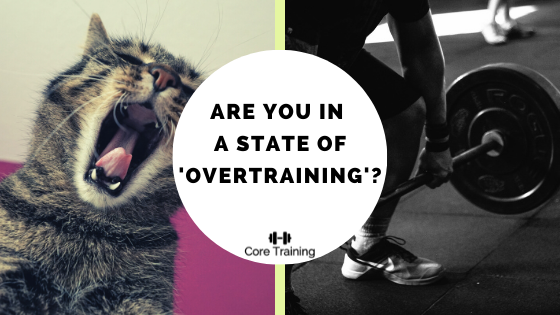Are you in a state of 'Overtraining'?
When it comes to exercise and fitness programs, often the most overlooked aspect is not the exercise or training itself, but actually the recovery from said training. It’s common, and a normal inclination for many people, to try and push as hard as possible and go ‘all out’ when they start a new program or regime. However, while this may bring very quick results in the immediate term, it can actually set you back in the medium to long term to go ‘too hard’ for an extended period of time. Today, I want you to go away from this blog reflecting on whether or not your training and recovery is well-balanced, or if you may be in a state of ‘overtraining’.
Unfortunately, more is not always better. That’s because, we don’t actually progress during exercise, but in-between - when we are resting and recovering from the stresses of exercise. That’s why, if we are training too much and neglecting our recovery, we are actually hindering our progress more than we are helping it! There are several signs and symptoms to look for to work out whether you are in a state of overtraining, here are the key ones:
Constant soreness: are you forever stiff and sore after your workouts - this might be a sign your muscles aren’t fully repaired after previous stresses.
Fatigue: are you consistently tired, lethargic and struggling to focus. Feeling fatigued most or all of the time is often a sign of overtraining.
Frequent Injuries: if you always find yourself battling injuries, and finding yourself picking up new ones, then it’s a clear sign you are putting more stress on your body than it can cope with, and probably need to reduce said stress.
Reduced Performance: if you find that your performance in your workout and exercise sessions is actually getting worse, rather than better, then you might find that the reason for this reduced performance is that you need to actually back off on your training and take it easier.
Lower immunity: similar to injuries, if you find yourself frequently picking up colds and illnesses, then this could be a sign that your immune system is compromised by you being overworked and overtrained.
Poor Sleep: Too much stress on your body will affect your hormones, which can have an impact on many aspects of your health, including sleep. If your sleep is out of whack, then again, consider whether or not you are training too much.
Lack of Motivation: if you no longer actually want to exercise or get in the gym, and feel demotivated by your exercise routine, then it’s a clear sign you need to change things up - and probably reduce the amount you are doing!
If you feel that a few of the points above apply to you, then it’s probably worth considering whether you are in fact in a state of overtraining! Too much exercise and/or not enough food or rest to recover from said exercise, is a recipe for disaster and a surefire way to put your body in a state of overtraining. If this is the case, then it’s worth taking a step back, and looking into ways that you can actually reduce the amount of stress that you are putting on your body. Try to reduce the time and frequency of your exercise, increase the amount of rest you take over the course of the week (perhaps adding in an extra day of no exercise) and even increasing the amount of nutritious food you are eating to help fuel your body for recovery, too.
So, have a think about your training, exercise and nutrition regime as a whole - is it benefitting you currently, or not? If you find that it is no longer serving as a complement to your life, then it might be worth evaluating whether you are in a state of overtraining, and need to make some changes now!


